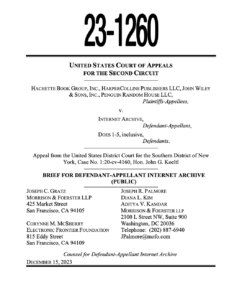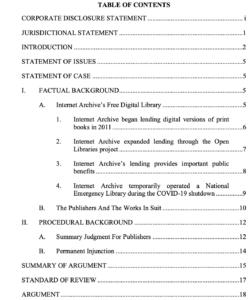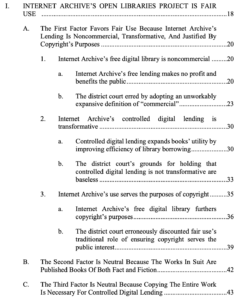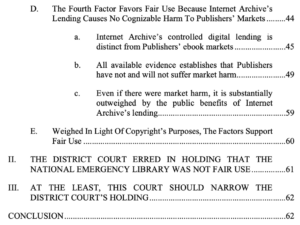Internet Archive Files Opening Brief in Appeal of Publisher Lawsuit (Hachette et al v. Internet Archive)
As we’ve done in the past we will be updating this post with media coverage, documents, amicus briefs and other filings, etc.
Update: March 22, 2024 at 4:30pm Eastern
- Brief For Amici Curiae The Authors Guild, Inc., American Photographic Artists, The American Society For Collective Rights Licensing, The American Society of Media Photographers, The Association of American Literary Agents, The Canadian Authors Association, The Dramatists Guild of America, European Visual Artists, The European Writers’ Council – Fédération Des Associations Européennes D’ecrivains, The International Authors Forum, The National Press Photographers Association, The National Writers Union, The North American Nature Photography Association, Romance Writers of America, Sisters In Crime, The Society Of Authors, and The Writers’ Union of Canada in Support Of Appellees
52 pages; PDF.- Brief For Amicus Curiae The Copyright Alliance in Support Of Plaintiffs-Appellees
36 pages; PDF.- Brief of Amici Curiae International Publishers Association, Federation of European Publishers, International Association of Scientific, Technical and Medical Publishers, International Confederation of Societies of Authors and Composers, International Federation of Film Producers Associations, International Video Federation, IFPI, Association of Canadian Publishers, Brazilian Book Chamber, Sindicato Nacional Dos Editores De Livros, nd Syndicat National De L’edition in Support Of Plaintiffs-Appellees
33 pages; PDF.- Brief of Amici Curiae The Recording Industry Association of America, The National Music Publishers’ Association, The Motion Picture Association, Inc., And The News/Media Alliance in Support Of Appellees and Affirmance
49 pages; PDF.- Brief of 24 Former Government Officials, Former Judges, and IP Scholars as Amici Curiae in Support Of Plaintiffs-Appellees
38 pages; PDF.- Brief of Amici Curiae Professors and Scholars of Copyright and Intellectual Property Law in Support Of Plaintiffs-Appellees and Affirmance
34 pages; PDF.
Update: January 3, 2024 at 5:30pm Eastern
- American Library Association (ALA) & Association of Research Libraries (ARL) File Brief in Support of Neither Party
34 pages; PDF.- Floor64, Inc. D/B/A The Copia Institute Files Brief in Support of Defendants-Appellants
22 pages; PDF.- Former and Current Law Library Directors, Professors, and Academics File Brief in Support of Defendant-Appellant
35 pages; PDF.- HathiTrust Files Amicus Files Brief in Support of Neither Party (Cured, Jan 3, 2023)
28 pages; PDF.; A statement/summary from HT is also available.- Intellectual Property Law Professors Files Brief in Support of Appellant
31 pages; PDF.- Nine Library Organizations and 218 Librarians File Brief in Support of Defendant-Appellant
55 pages; PDF.- Wikimedia Foundation, Creative Commons, and Project Gutenberg Literary Archive Foundation File Brief in Support of Defendant-Appellant and Reversal
38 pages; PDF.Previously Filed Amicus Briefs
- In Support of Appellant: Brief Filed by Authors Alliance
38 pages; PDF.- In Support of Appellants and Reversal: Brief Filed By Kevin L. Smith and William M. Cross
35 pages; PDF- In Support of Defendant-Appellant and Reversal: Center for Democracy & Technology, Library Freedom Project, and Public Knowledge File Joint Amicus Brief
Brief (56 pages; PDF) ||| CDT News Release ||| PK News Release- Group of Copyright Scholars From Technology Law and Policy Clinic, New York University School of Law in Support of Defendant-Appellant and Reversal (Filed 12/18)
Last Update: December 29, 2024 at 1:30pm Eastern
—-End Update—-
Appeal: Hachette Book Group, Et Al v. Internet Archive
Today’s News (December 15, 2023)
From an Internet Archive Blog Post:
From Brewster Kahle, Digital Librarian And Founder of the Internet Archive
This lawsuit is about more than the Internet Archive; it is about the role of all libraries in our digital age. This lawsuit is an attack on a well-established practice used by hundreds of libraries to provide public access to their collections. The disastrous lower court decision in this case holds implications far beyond our organization, shaping the future of all libraries in the United States and unfortunately, around the world.
This appeal underscores the role of libraries in supporting universal access to information—a right that transcends geographic location, socioeconomic status, disability, or any other barriers. Our digital lending program is not just about lending responsibly; it’s about strengthening democracy by creating informed global citizens.
If this decision is left to stand, it will take away a library’s ability to lend books from its permanent collections to digital learners.
In the face of challenges to truth, libraries are more vital than ever.
Let this be a call to action—to protect the core mission of libraries in our digital age.
From Corynne McSherry, legal director of the Electronic Frontier Foundation:
“The publishers are not seeking protection from harm to their existing rights. They are seeking a new right: the right to take advantage of technological developments to control how libraries may lend the books they own.
Read the Complete Blog Post (Includes Comments by:
- Michael Blackwell, public library director, St. Mary’s County Library, Maryland:
- John Chrastka, executie director, EveryLibrary
- Winston Tabb, Library of Congress & Johns Hopkins University Library (retired)
More Comments
Our digital lending program is not just about lending responsibly. It’s about strengthening democracy by creating informed global citizens. The stakes of the lower court decision are high. Publishers coordinated by the AAP have removed hundreds of thousands of books from controlled digital lending. The publishers have taken more than 500 banned books from our lending library, such as “1984,” “The Color Purple,” and “Maus.”
This is a devastating loss for digital learners everywhere. This lawsuit is more than about the Internet Archive. It is about the role of our libraries in our digital age. This lawsuit is an attack on a well-established practice used by hundreds of libraries to provide public access to their collections.
Direct to Kahle’s Complete Statement
From Corynne McSherry
For the past decade, that evolution has included controlled digital lending, a modern, more efficient version of lending that’s used by libraries across the country. Controlled digital lending allows libraries to lend books via the internet subject to strict controls for a limited time to one patron at a time. But four giant publishers claim that this public service violates their copyrights and threatens their businesses.
They’re wrong.
Libraries have paid publishers billions of dollars for the books in their print collections. Controlled digital lending merely helps libraries better serve their patrons, but still lending just one book at a time. It’s fundamentally the same as traditional library lending and poses no harm to authors or the publishing industry and in fact, the concrete evidence in this case shows that the Internet Archive’s digital lending does not and will not harm the market for books.
The district court gave short shrift to that evidence, one of many flaws in the ruling. Another flaw was that it concluded that offering a free public library is actually a commercial activity.
According to the court, a nonprofit has a commercial purpose if it derives virtually any benefit connected to a work, including ordinary nonprofit activities like attracting new members, receiving recognition from a community, or having a donate button on the website.
That definition of commercial runs contrary to well-established precedent. And what is worse, it would apply to almost every library and public interest organization in the country. It just doesn’t make sense.
Our brief explains why the court was wrong and why controlled digital lending is a lawful fair use. But the core problem is this. The publishers here are not seeking protection from harm to their existing rights. Instead, they’re seeking a new right, the right to take advantage of technological innovation to control how libraries can lend the books they own. They should not succeed.
Next Steps? Comment by Corynne McSherry at News Conference
So today is our opening salvo, but it’s going to take several months for all of the briefing to be completed. So in the beginning of the year, and I think it’s February, we will have, the publishers will file their response brief, and then we will reply. And then we will wait for the court to schedule oral argument, to schedule a hearing.
So realistically, the timeline, I would say, minimally, we’re looking at six months between now and a hearing.
Note: McSherry also that the deadline for amicus briefs to be filed is one week. They (EFF, IA) are expecting several to be filed very soon.
The Brief Filed by Internet Archive (12/15):
Statement of Issues: Whether Internet Archive’s controlled digital lending is fair use.
Direct to Full Text of Brief (via CourtListener/RECAP)
74 pages; PDF.
Complete Docket (Appeal)
Statements
Media Coverage
-
Authors & Copyright Scholars Back ‘Internet Archive’ in Landmark Legal Battle (via Torrent Freak)
-
Internet Archive Seeks Reversal in Book Scanning Suit (via PW)
Internet Archive Tells 2nd Circ. E-book Lending Is Fair Use (via Law360, paywall)
Background: How We Got Here About the Lawsuit
- Both of these posts contain many (links to filing, media reports, etc.)
1 (Notice of Appeal Filed 9/11/2023) ||| 2 Lawsuit Roundup
Filed under: Academic Libraries, Associations and Organizations, Companies (Publishers/Vendors), Digital Preservation, Libraries, News, Patrons and Users, Public Libraries, Publishing, Reports, Roundup
About Gary Price
Gary Price (gprice@gmail.com) is a librarian, writer, consultant, and frequent conference speaker based in the Washington D.C. metro area. He earned his MLIS degree from Wayne State University in Detroit. Price has won several awards including the SLA Innovations in Technology Award and Alumnus of the Year from the Wayne St. University Library and Information Science Program. From 2006-2009 he was Director of Online Information Services at Ask.com.






